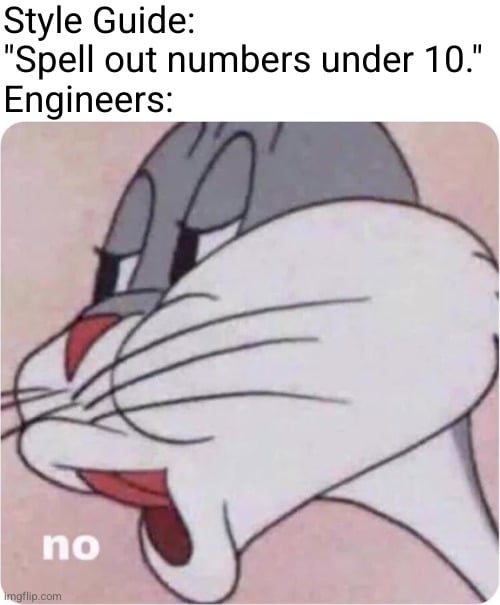this post was submitted on 20 Oct 2024
466 points (97.6% liked)
Science Memes
11148 readers
2024 users here now
Welcome to c/science_memes @ Mander.xyz!
A place for majestic STEMLORD peacocking, as well as memes about the realities of working in a lab.

Rules
- Don't throw mud. Behave like an intellectual and remember the human.
- Keep it rooted (on topic).
- No spam.
- Infographics welcome, get schooled.
This is a science community. We use the Dawkins definition of meme.
Research Committee
Other Mander Communities
Science and Research
Biology and Life Sciences
- [email protected]
- [email protected]
- [email protected]
- [email protected]
- [email protected]
- [email protected]
- [email protected]
- [email protected]
- [email protected]
- [email protected]
- [email protected]
- [email protected]
- [email protected]
- [email protected]
- [email protected]
- [email protected]
- [email protected]
- [email protected]
- [email protected]
- [email protected]
- [email protected]
- [email protected]
- [email protected]
- [email protected]
- !reptiles and [email protected]
Physical Sciences
- [email protected]
- [email protected]
- [email protected]
- [email protected]
- [email protected]
- [email protected]
- [email protected]
- [email protected]
- [email protected]
Humanities and Social Sciences
Practical and Applied Sciences
- !exercise-and [email protected]
- [email protected]
- !self [email protected]
- [email protected]
- [email protected]
- [email protected]
Memes
Miscellaneous
founded 2 years ago
MODERATORS
you are viewing a single comment's thread
view the rest of the comments
view the rest of the comments

Context is everything, IMO.
In engineering work, numbers should always be digits. In prose, numbers should be spelled out.
Compared to
To me it's pretty clear which of those reads better and more naturally as prose; digits really 'jump out' on the page, and while that is great for engineering texts, it is incongruent and distracting for prose.
Somewhat relevant to your example, recipes should have numbers in digits too. (But then again recipes are basically an engineering text.)
I would love to see more systematic recipe formats.
Around 15-20 years ago there was a website called "Cooking for Engineers" that used a table format for recipes that was pretty clever, and a very useful diagram for how to visualize the steps (at least for someone like me). I don't think he ever updated the site to be mobile friendly but you can see it here:
Cheesecake
Dirty Rice
He describes the recipe in a descriptive way, but down at the bottom it lists ingredients and how they go together in a chart that shows what amounts to use, what ingredients go into a particular step, what that step is, and how the product of that step feeds into the next step.
Oh damn that’s a sensical format. I love it and may put my recipes in it once I start writing them properly
What kind of insanity is this a pound is 500g.
Your cups weigh 195g a piece? Reasonable for stoneware, I guess. But why are you telling me and what does it have to do with the mass of rice?
Cooking is just applied chemistry, after all.
I've seen Breaking Bad, yes
Yeah that's fair. I personally prefer the first one, but I can see how it makes sense to not use digits there.
+1 ∆ for you (change my view points, a thing from r/changemyview)
In your example tho, you want those numbers to stand out. The reason the affair was busy, was because of the numbers. You want the numbers to jump out, because that's the important detail.
I appreciate your point, but I still believe spelled-out numbers work better.
In prose, especially fiction writing, the ideal case is that the words themselves slide neatly out of the way and become invisible, leaving only a picture in the reader's mind. Generally speaking, anything distracting is therefore counter-productive for fiction. Strange fonts and strange typesetting, while interesting, take the reader out of the prose. There's a reason almost every fiction book you pick up from the shelf uses Garamond.
In an engineering context, remembering exactly "12 eggs, 6 toast" is probably the most important thing, and numeric digits assist in that. In fiction however it doesn't matter if, by the next page, the reader has forgotten exactly how many eggs there were; the important aspect is to convey the sense of a large and chaotic family, and the overall impression is more important than the detail.
Thats why although the numbers are important for setting the scene, we really don't want them to jump out and steal attention. We don't want anything at all to have undue prominence, because the reader needs to process the paragraph as a cohesive whole, and see the scene, not the specific numbers.
I was taught you only spell out numbers ten and under, so I would write it:
yeah the first, we don't need letters when we have numbers